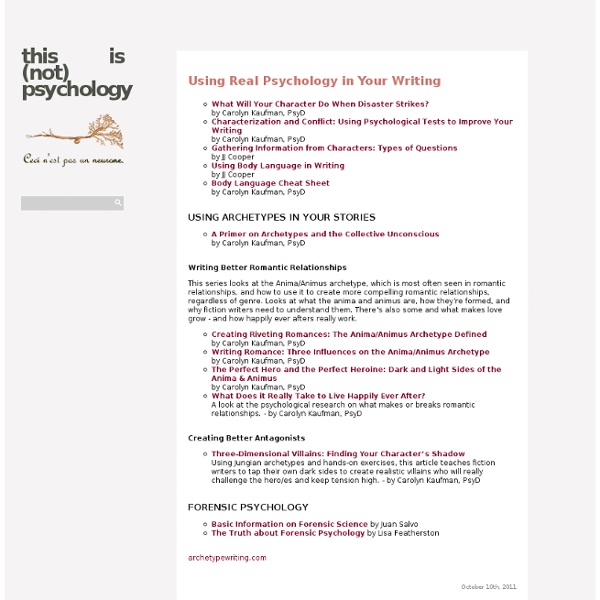



http://thisisnotpsychology.tumblr.com/post/11252306754/using-real-psychology-in-your-writing
The Psychology Of Color "Color has long been understood to be something which appeals greatly to our visual senses, and it is frequently a tool utilized in marketing. Countless studies have found that particular colors have their own effects on consumers, with some colors stimulating areas of the brain in ways which will either promote excitement or tranquility. In this manner, corporations and popular businesses and brands can easily target their market simply by picking the right combination of colors to visualize their marketing campaign, logo, content and website. How are you incorporating color into your website design?"
Psychological Facts Psychology is a powerful thing. It’s responsible for so much of what we do in life whether we’re conscious of it or not. Luckily, we’re here to help enlighten you about your own brain. Here are eight powerful psychological facts that will help you understand a lot more about life. Psychological Experiments We present you the most notorious and most popular experiments of all-time. Some of the most fascinating and deplorable experiments ever conducted that proove that we do have a dark side… During the 1950s, Solomon Asch conducted and published a series of laboratory experiments that demonstrated the degree to which an individual’s own opinions are influenced by those of a majority group.
How the Brain Works by Maria Popova From the caves of memory to the castles of deception, by way of naughty neurotransmitters and giddy ganglia. Scientists are only just beginning to understand how the brain works — from what transpires in it while we sleep to how to optimize its memory to what love does to it to how music affects it — and the rest of us fall somewhere on the spectrum between fascinated and confused when it comes to the intricate inner workings of our master-controller. From British indie press Nobrow — who also brought us Freud’s graphic biography, those lovely illustrated chronicles of the Space Race and aviation, as well as Blexbolex’s magnificent No Man’s Land — comes Neurocomic (public library), a graphic novel about how the brain works. This remarkable collaboration between Dr. Hana Roš (and dog knows I love few things more than a female neuroscientist) and neuroscience-PhD-turned-illustrator Dr.
ISFJ This article is about the Myers-Briggs personality type. For the Socionics ISFj, see Ethical Sensory Introvert. ISFJ (Introversion, Sensing, Feeling, Judging) is an abbreviation used in the publications of the Myers-Briggs Type Indicator (MBTI) to refer to one of sixteen personality types.[1] The MBTI assessment was developed from the work of prominent psychiatrist Carl G. How Languages We Speak Affect The Way We Think Keith Chen (TED Talk: Could your language affect your ability to save money?) might be an economist, but he wants to talk about language. For instance, he points out, in Chinese, saying “this is my uncle” is not as straightforward as you might think. In Chinese, you have no choice but to encode more information about said uncle.
Psychometric The Psychology Department has the following tests which may be used only by Psychology staff and students for testing purposes. They are available to be borrowed from Karen Fleet in the Psychology & Philosophy Library which is staffed 9-5 on weekdays during term-time. For more detailed information on which test is appropriate for your study please consult your supervisor or demonstrator. As well as looking at the list of tests held by the department you can do a keyword search on databases such as the Web of Knowledge. There are a number of web pages which give guidance on psychological testing such as the American Psychological Association's 'Testing and Assessment Program' or the British Psychological Society's 'Psychological Testing Centre (PTC)'.
Psychology of Trust in Work and Love by Maria Popova The science of why tit-for-tat isn’t the best strategy for cooperation and why you should hear out your hunches. “When you trust people to help you, they often do,” Amanda Palmer asserted in her beautiful meditation on the art of asking without shame. But what does it really mean to “trust,” and perhaps more importantly, how can we live with the potential heartbreak that lurks in the gap between “often” and “always”? That’s precisely what psychologist David DeSteno, director of Northeastern University’s Social Emotions Lab, explores in The Truth About Trust: How It Determines Success in Life, Love, Learning, and More (public library).
Signs You're An Introvert Think you can spot an introvert in a crowd? Think again. Although the stereotypical introvert may be the one at the party who’s hanging out alone by the food table fiddling with an iPhone, the “social butterfly” can just as easily have an introverted personality. “Spotting the introvert can be harder than finding Waldo,” Sophia Dembling, author of “The Introvert’s Way: Living a Quiet Life in a Noisy World,” tells The Huffington Post. Stop Overthinking What is holding people back from the life that they truly want to live? I’d say that one very common and destructive thing is that they think too much. They overthink every little problem until it becomes bigger and scarier and it actually is. Overthink positive things until they don’t look so positive anymore. Or overanalyze and deconstruct things and so the happiness that comes from just enjoying something in the moment disappears. Now, thinking things through can be a great thing of course.